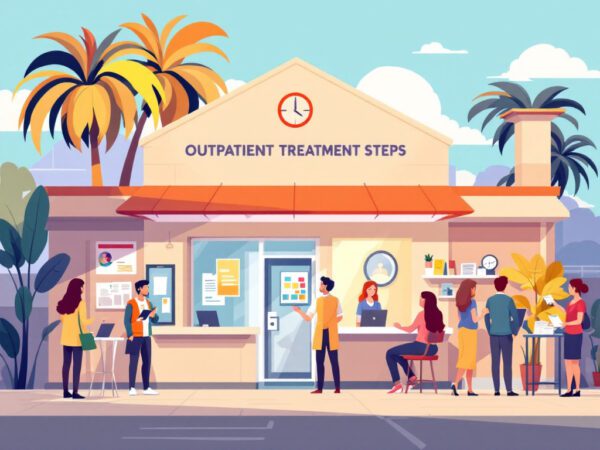Why Consider Outpatient Treatment?
Outpatient addiction treatment is an essential option for those struggling with substance abuse. We recognize that each individual’s journey is unique, and the choice of treatment can significantly impact recovery. Outpatient programs provide a valuable alternative that merits consideration for various reasons.
Benefits of Outpatient Treatment
Outpatient programs offer a more flexible option, enabling individuals to live at home while attending scheduled therapy sessions and support groups. This type of treatment is particularly suitable for mild-to-moderate addiction and transitions post-inpatient care. The benefits of outpatient addiction treatment include:
- Flexibility: Participants can maintain daily responsibilities such as work or school, allowing them to integrate coping skills into everyday life.
- Affordability: Generally, outpatient programs are less expensive than inpatient options, making treatment more accessible.
- Ongoing Support: Individuals receive professional assistance while gradually reintegrating into their community.
The following table summarizes some of the prominent benefits of outpatient addiction treatment:
| Benefit | Description |
|---|---|
| Flexibility | Balance daily life with therapy sessions |
| Affordability | Lower cost compared to inpatient facilities |
| Community Integration | Opportunities to practice skills in real-life situations |
| Continuous Support | Access to therapists and support groups |
For more information on different levels of outpatient care, explore our article on intensive outpatient program.
Challenges of Outpatient Treatment
Despite its advantages, outpatient addiction treatment is not without challenges. Some obstacles that individuals may face include:
- Exposure to Triggers: Being in familiar environments can lead to encounters with people or situations that challenge sobriety.
- Limited Medical Support: Outpatient settings may not provide the same level of medical oversight as inpatient care, which can be crucial for some individuals.
- Self-Discipline Requirement: Achieving success in outpatient programs demands a certain degree of self-discipline, as individuals manage their recovery without the structure available in residential programs.
The following table outlines some common challenges associated with outpatient addiction treatment:
| Challenge | Description |
|---|---|
| Exposure to Triggers | Increased risk of encountering relapse triggers |
| Limited Medical Support | Less access to medical professionals compared to inpatient care |
| Self-Discipline Required | Personal commitment is essential for success |
Understanding the pros and cons of outpatient programs is crucial. We recommend exploring our articles on partial hospitalization program and individualized intensive program to find the best treatment options suited for you or a loved one.
Outpatient Addiction Therapy
Outpatient addiction therapy offers a vital support system during recovery. In this section, we explore two key components of outpatient addiction treatment: therapeutic approaches and the role of behavioral therapy.
Therapeutic Approaches in Outpatient Care
Outpatient treatment programs for substance use disorders provide a range of therapeutic approaches tailored to individual needs. These programs may include standard outpatient programs, intensive outpatient programs (IOP), and partial hospitalization programs (PHP) (Innovative Health Systems).
In outpatient care, patients can expect to participate in a combination of group and individual counseling, substance use disorder education, life skills training, and relapse prevention training. Treatment plans are customized to fit the unique circumstances of each individual. Common therapeutic techniques involve:
- Cognitive Behavioral Therapy (CBT): This widely used method focuses on changing negative thought patterns and behaviors related to substance use. CBT typically consists of 12 to 16 sessions, with studies showing a success rate of about 60% for maintaining long-term recovery (Right Choice Recovery).
- Contingency Management: This approach reinforces positive behaviors by providing rewards for achieving certain treatment goals. It’s effective in increasing treatment adherence and decreasing substance use.
Here’s a table summarizing key therapeutic techniques often utilized in outpatient addiction treatment:
| Therapeutic Approach | Description | Typical Duration |
|---|---|---|
| Cognitive Behavioral Therapy (CBT) | Focuses on changing thought patterns and behaviors | 12 – 16 sessions |
| Contingency Management | Provides rewards for achieving treatment objectives | Varies |
| Group Counseling | Offers peer support and shared experiences | Ongoing |
Role of Behavioral Therapy
Behavioral therapy plays a crucial role in outpatient addiction treatment. It helps individuals make significant behavioral changes, acquire new coping skills, and prevent relapse. Combining behavioral therapy with Medication-Assisted Treatment (MAT) creates a comprehensive recovery plan (American Addiction Centers).
Outpatient programs often integrate various forms of behavioral therapy, including:
- Individual Counseling: Personalized sessions address specific challenges and goals.
- Group Therapy: Participants share experiences in a supportive environment, gaining insights and encouragement from peers.
- Relapse Prevention Training: Strategies are developed to identify triggers and manage cravings effectively.
The combination of these therapeutic approaches helps create a supportive framework for individuals in recovery, allowing for a flexible yet structured path to lasting change. For additional insights, consider exploring our intensive outpatient program or partial hospitalization program.
Individualized Outpatient Programs
At Totality Treatment, we emphasize the importance of individualized outpatient programs that cater specifically to each patient’s unique needs. This approach ensures that those seeking recovery receive the most effective and personalized care possible.
Tailored Treatment Plans
Each patient’s journey through addiction treatment is distinct, and we recognize this fact in our approach to outpatient addiction treatment. Our tailored treatment plans are designed to fit the individual’s strengths, goals, and specific treatment objectives, facilitating a recovery path that is both supportive and effective.
The development of a tailored treatment plan involves a comprehensive assessment of the severity of the substance use disorder, lifestyle, and personal preferences. Patients may benefit from various therapeutic methods, including intensive outpatient programs, partial hospitalization programs, and individualized intensive programs.
| Treatment Component | Description |
|---|---|
| Initial Assessment | Comprehensive evaluation of individual needs |
| Personalized Goals | Collaborative setting of achievable recovery milestones |
| Ongoing Support | Regular check-ins and adjustments to the treatment plan |
Our focus on customized care allows patients to remain engaged and motivated throughout their treatment journey.
Flexibility in Duration
One of the significant advantages of outpatient programs is their flexibility in duration. Depending on the individual’s progress and unique circumstances, treatment can last anywhere from 3 to 6 months, but we understand that more serious cases may extend well beyond a year. This flexibility accommodates patients with various commitments and responsibilities, allowing them to manage their recovery while fulfilling daily obligations, making outpatient treatment an attractive option for many (WisHope Recovery).
Unlike inpatient care, which typically requires a more rigid schedule, outpatient treatment offers the possibility of adapting session frequency and intensity to best suit the recovery journey. This adaptability enables patients to access recovery support outpatient while balancing their work, family, or educational responsibilities.
Overall, the combination of personalized treatment plans and flexible durations within our outpatient programs contributes significantly to the effectiveness and success of recovery efforts, ensuring every individual can dedicate the time and energy needed for lasting change.
Transitioning to Outpatient Care
Transitioning from inpatient care to outpatient addiction treatment can be a pivotal moment in a person’s recovery journey. This shift allows individuals to continue their healing while reintegrating into their daily lives.
Post-Inpatient Recovery
After completing an inpatient program, many individuals benefit from the ongoing support provided by outpatient treatment. This form of care is designed to help individuals manage their recovery while addressing daily responsibilities. Outpatient programs often include both standard outpatient services and more intensive outpatient programs (IOPs) that require frequent attendance (WisHope Recovery).
Outpatient care allows individuals to keep their support systems intact. Those with strong support networks at home can navigate recovery while staying connected to loved ones. Research suggests that outpatient treatment can lead to better detoxification completion rates compared to inpatient care, particularly for those dealing with alcohol dependence (NCBI Bookshelf).
| Duration of Care | Average Length |
|---|---|
| Standard Outpatient | 3 – 6 months |
| Intensive Outpatient | 3 – 12 months or longer for severe cases |
Support and Resources
To enhance the effectiveness of outpatient treatment, various support services are available. These can include:
- Family Case Management: Support for family members to navigate the recovery process together.
- Psychiatric Support: Regular check-ins with mental health professionals to manage co-occurring disorders.
- Aftercare Planning: Establishing a plan for continued support after completing outpatient programs.
In addition, resources like addiction telehealth treatment can provide remote support and therapy for those unable to attend in-person sessions. Utilizing these resources strengthens the recovery journey, making it easier to handle challenges as they arise.
For those seeking a comprehensive solution, the combination of outpatient programs and support services provides a strong framework for lasting change. Utilizing these pathways helps maintain individual progress while ensuring a stable return to day-to-day responsibilities.
Effectiveness of Outpatient Treatment
Outpatient addiction treatment provides a viable option for individuals seeking recovery while maintaining their daily routines. Understanding the effectiveness of this approach involves examining success rates and the factors that influence overall outcomes.
Success Rates
Research indicates that outpatient care often leads to better detoxification completion rates than inpatient care, with no differences in safety outcomes. This finding highlights the effectiveness of outpatient addiction treatment in promoting successful recovery for many individuals.
| Treatment Type | Detox Completion Rate (%) | Safety Outcomes |
|---|---|---|
| Outpatient Care | Higher | No significant differences |
| Inpatient Care | Lower | No significant differences |
While specific success rates can vary based on individual circumstances, the adaptability of outpatient programs allows for personalized treatment that aligns with each person’s needs. The ability to adjust the duration of outpatient addiction treatment based on factors like the severity of substance misuse and progress is vital in ensuring effective recovery.
Factors Influencing Success
Several factors can impact the success of outpatient addiction treatment. One key element is an individual’s level of self-motivation. Patients with a strong desire for recovery typically excel in outpatient settings, actively engaging in therapy and maintaining progress. Other factors include:
- Individualized Treatment Plans: Tailored programs based on personal needs significantly enhance effectiveness.
- Therapeutic Environment: Supportive family and community involvement can foster a more conducive atmosphere for recovery.
- Access to Resources: Availability of counseling sessions and additional services, such as medication management and case management, plays a crucial role in treatment success.
Patients can expect to participate in various counseling sessions tailored to their needs. For those seeking remote options, addiction telehealth treatment and hybrid outpatient programs offer flexible solutions. Furthermore, evidence-based guidelines recommend safer withdrawal management for patients with opioid use disorder in outpatient settings, further ensuring their chances of successful treatment.
Individual commitment and a supportive environment are instrumental in achieving lasting change through outpatient addiction treatment. The blend of structured support and personal motivation works together to create a robust foundation for recovery.
Financial Aspects of Outpatient Care
When considering outpatient addiction treatment, it is essential to understand the financial implications, including cost comparisons and insurance coverage. We aim to provide clarity on these matters as they play a significant role in the decision-making process for individuals seeking treatment.
Cost Comparison
Outpatient addiction treatment is generally more affordable than inpatient programs. Various factors influence the cost of outpatient care, such as location, facility types, insurance, level of care, duration of treatment, and additional services provided. On average, estimates suggest that outpatient treatment costs are lower than those for inpatient detox or treatment programs.
| Treatment Type | Estimated Cost Range (per session) |
|---|---|
| Outpatient Program | $100 – $500 |
| Intensive Outpatient Program | $300 – $600 |
| Detox Placement | $1,000 – $2,000+ |
| Inpatient Treatment | $5,000 – $20,000+ |
While this provides a basic idea of costs, individuals should consider that financial situations differ. We encourage individuals to contact specific facilities to discuss their pricing structures and available options. For a comprehensive understanding of various program types, please explore our pages on intensive outpatient program and partial hospitalization program.
Insurance Coverage Implications
Most insurance carriers cover addiction treatment, including behavioral therapies, as mandated by the Affordable Care Act (ACA). This act requires coverage for mental health and substance use disorder services (American Addiction Centers).
The extent of coverage may vary based on the individual’s insurance plan, including what type of treatment is included, the number of sessions covered, and the overall out-of-pocket cost. Considering the variety of outpatient services available, individuals should clarify their insurance benefits before commencing any treatment program. For more details on how outpatient care works after detox, visit our section on outpatient care after detox.
By comprehensively evaluating costs and understanding insurance implications, we can support individuals and their families as they navigate their addiction recovery journey.















